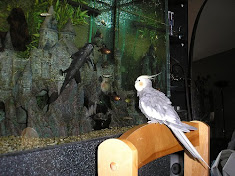 |
| Pet Coatimundi by Lee Ann Barker |
The next important thing that you need to know about raising your exotic pet would be the right time when to wean. This is usually up to the pet owner and can be based on your own circumstances. You have to know that the more frequently you bottle feed your baby coati, the less inclined it's going to be on eating solid foods. At 5 to 6 weeks of age, you should start leaving some dry puppy food for your exotic pet. When you start feeding solid foods to your exotic pet, you can mix some apple juice with puppy food or monkey biscuits. Each coati is considered as individual with its own unique taste buds. Some of the favorite foods of coatis include pizza, luncheon meats, newtons, blueberry muffins, watermelon, eggs, and bananas.
Vaccination schedules are another thing that you should consider. These should be the same with puppies and kittens. First vaccinations and worming are given at 5 to 6 weeks of age. After which, this is then done every 3 weeks until coatis reach the age of 16 weeks. Annual boosters and worming are also highly advised. Aside from this, coatis should also receive a dog distemper-parvo shot or DHLP-P and the cat panleukopenia vaccine. You can have your pet coati wormed with any good cat wormer or dog wormer.
Next, never use too much counter flea products because most of these things are toxic to exotic animals. If you have a pet coati that's below 12 weeks of age, it would be best for you to spray Adams brand flea spray on a towel and wipe it on its skin. Don't overdo this.
Lastly, if you have a male coati, it's highly advised that you have it neutered. Males that are intended to be breeders on the other hand, should be mother raised or should be placed in the breeder pen at 4 to 6 months of age.
Author Resource: Written by Autin Hatcher
Read more about important details regarding raising a pet coatimundi at the Tifkar Publishing website.
Article Source: http://EzineArticles.com/?expert=Austin_Hatcher
http://EzineArticles.com/?Raising-A-Pet-Coatimundi:-Learn-The-Details&id=5962981



0 comments:
Post a Comment